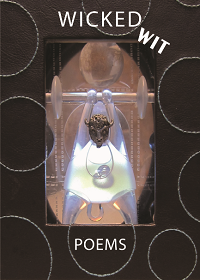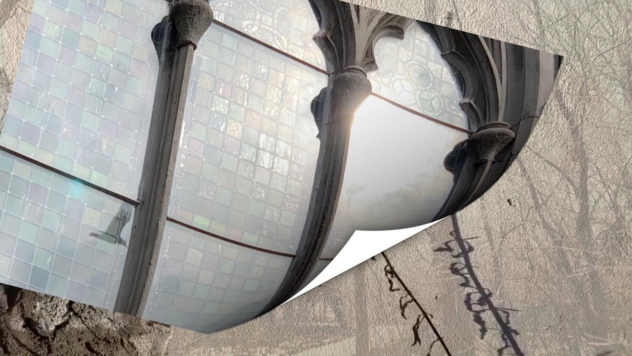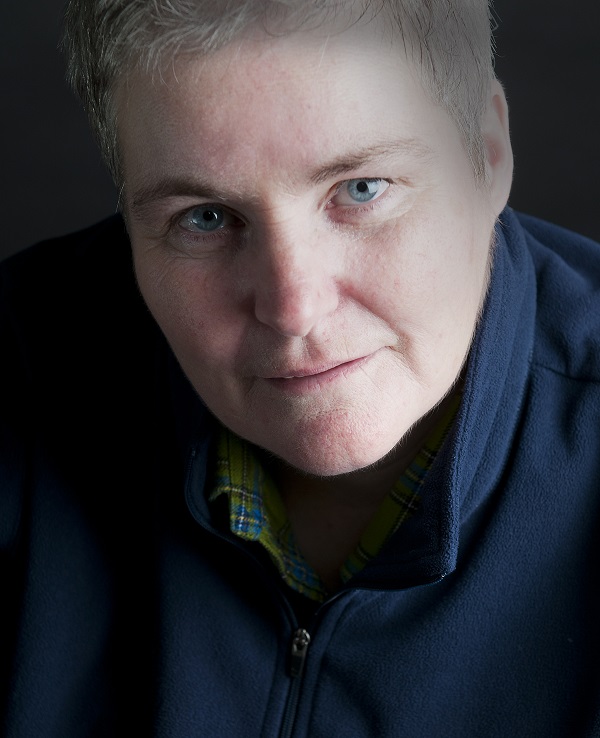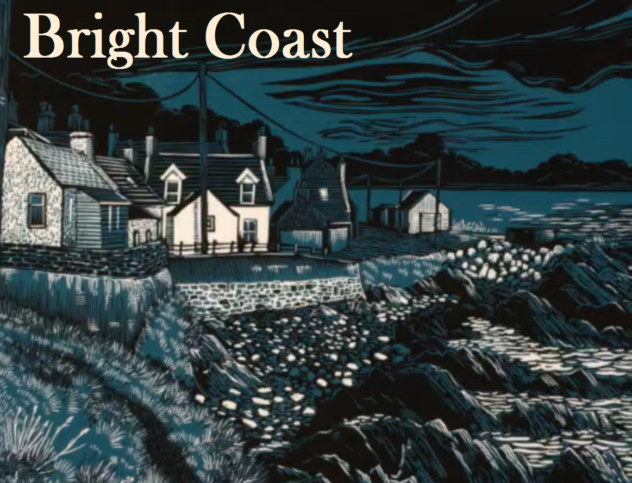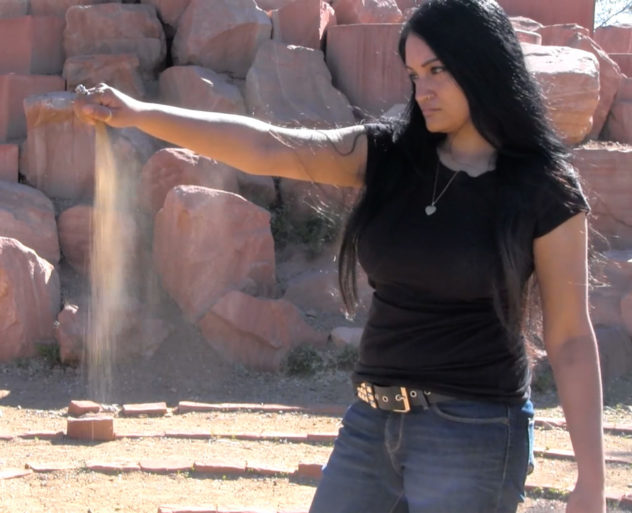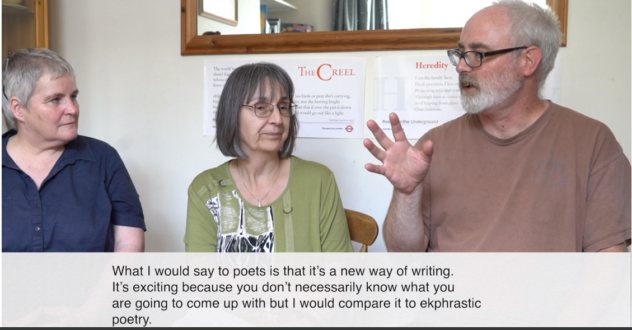Stevie Smith (Florence Margaret Smith, 1902 -1971) was an English poet and novelist. She wrote nine volumes of poetry. A Good Time Was Had By All established her reputation as a poet of whose “combination of “caprice and doom” was a characteristic of both her poems and the quirky line drawings that often accompanied them. Smith’s work thrives on co-existing contradictions: jokey and serious; colloquial and formal; sophisticated and child-like. Nursery-rhyme motifs, puns and seemingly light-hearted verse structures are used to explore unsettling depths. The most famous example of this is the much-anthologised ‘Not Waving But Drowning’ which was also the title of her 1957 collection. In the 1960s Smith built a popular reputation as a performer of her own work, playing up her eccentricity and ceremonially half-singing some of her poems in a quavering voice. She also made a number of broadcasts for the BBC.
 Poet and editor Kevin Prufer is the author of In a Beautiful Country (2011), a finalist for the Rilke Prize and listed as a 2011 Notable Book by the Academy of American Poets, and National Anthem (2008), named best poetry book of the year by the Virginia Quarterly Review. Other collections of poetry include Fallen From a Chariot (2005), The Finger Bone (2002, reissued 2013), and Strange Wood(1997). A bilingual edition of Prufer’s poetry appeared in Germany as Wir wollten Amerika finden: ausgewählte Gedichte: zweisprachig (2011), selected and translated by Norbert Lange and Susanna Mewe. Prufer edits the journal Pleiades: A Journal of New Writing and is a Professor at the University of Houston.
Poet and editor Kevin Prufer is the author of In a Beautiful Country (2011), a finalist for the Rilke Prize and listed as a 2011 Notable Book by the Academy of American Poets, and National Anthem (2008), named best poetry book of the year by the Virginia Quarterly Review. Other collections of poetry include Fallen From a Chariot (2005), The Finger Bone (2002, reissued 2013), and Strange Wood(1997). A bilingual edition of Prufer’s poetry appeared in Germany as Wir wollten Amerika finden: ausgewählte Gedichte: zweisprachig (2011), selected and translated by Norbert Lange and Susanna Mewe. Prufer edits the journal Pleiades: A Journal of New Writing and is a Professor at the University of Houston.
Kevin Prufer on Stevie Smith
The author of several novels and award-winning poetry collections, Stevie Smith is mostly remembered today for only one short poem, her chilling “Not Waving, But Drowning,” a strange, nearly Dickinsonian meditation on what?—loneliness? failure of empathy? futility and despair? But anyone who picks up her stirring Collected Poems will find in it a poet enormous wit, vitality, and range—not to mention technical bravura and musical dexterity.
Born Florence Margaret Smith in 1902, Stevie Smith spent most of her life among women. Her father abandoned the family when she was only two. Her mother died when she was sixteen. The remainder of her life she spent with her sister and her aunt Madge in the family home, working for thirty years as a publisher’s secretary (a position she immortalized in her hilarious Novel on Yellow Paper, which she insisted be printed on paper resembling a yellow secretarial pad.) This isn’t to say, however, that her life was entirely reclusive—a situation we seem all too ready to assign to women authors and artists. She had many literary friends and saw considerable public success for her work, particularly after leaving her secretarial position (following a nervous breakdown) and performing her poetry (which she often marvelously illustrated with faux-naive line-drawings) on the BBC and in the pages of many of London’s leading literary journals.
Amid the louder voices of mid-20th century English language poetry—Larkin, Frost, Bishop, etc.—Smith’s work might easily be described as an off-kilter, quirky sort of eddy, working apart from the dominant literary movements of the 1930s-60s. Still, it’s not hard to find in it hints of the Modernist sensibility, as Smith looks out over a world nearly emptied of meaning, a world in which truth often seems to be created only within the mind that observes it. Elsewhere, she resembles the Confessional poets, poets who find their inspiration not just in literature but in the ideas of psychoanalysis, who perform their selves (and their failures and sins) for an audience of observers. (It should be no surprise, for instance, that Sylvia Plath was an enormous fan.)
And there’s something even of Mary McCarthy in her slicing wit and her readiness to dice up the foibles of the middle class, the literary aesthetes, the crass, the vulgar, and the devout. But there’s much more to her work than mere wit and satire. Stevie Smith is a poet of deep theological anxiety, and I sense in her surface playfulness a mind constantly in motion, filled with spiritual double-mindedness, at once suspicious of those who would affirm (for instance) the existence of God, spirituality, or a truth outside the confines of the self … and, at the same time, desperate to believe in them. (She described herself as a “lapsed atheist” and once offered up these lines: “There is a God in whom I do not believe/Yet to this God my love stretches.”) Sometimes, her wit barely conceals her anxiety, other times it lays that anxiety bare, the poet grinning skullishly as she confronts cruelty, despair, and hypocrisy. Frequently, the music in her poems works in counterpoint to the poems’ paraphrase-able meaning, creating a kind of ambivalent tension, as if the speaker feels strongly in two directions, one suggested by the thoughts the poem asserts, the other by the feelings her musical choices suggest.
I’ve selected a handful of Smith’s best poems to discuss, and hope to touch mostly on her musical and rhetorical choices, the complexity of her thoughts on mortality, the divine, and the vagaries of human nature. And anything else that interests others…!
Pretty
Why is the word pretty so underrated?
In November the leaf is pretty when it falls
The stream grows deep in the woods after rain
And in the pretty pool the pike stalks
He stalks his prey, and this is pretty too,
The prey escapes with an underwater flash
But not for long, the great fish has him now
The pike is a fish who always has his prey
And this is pretty. The water rat is pretty
His paws are not webbed, he cannot shut his nostrils
As the otter can and the beaver, he is torn between
The land and water. Not ‘torn’, he does not mind.
The owl hunts in the evening and it is pretty
The lake water below him rustles with ice
There is frost coming from the ground, in the air mist
All this is pretty, it could not be prettier.
Yes, it could always be prettier, the eye abashes
It is becoming an eye that cannot see enough,
Out of the wood the eye climbs. This is prettier
A field in the evening, tilting up.
The field tilts to the sky. Though it is late
The sky is lighter than the hill field
All this looks easy but really it is extraordinary
Well, it is extraordinary to be so pretty.
And it is careless, and that is always pretty
This field, this owl, this pike, this pool are careless,
As Nature is always careless and indifferent
Who sees, who steps, means nothing, and this is pretty.
So a person can come along like a thief—pretty!—
Stealing a look, pinching the sound and feel,
Lick the icicle broken from the bank
And still say nothing at all, only cry pretty.
Cry pretty, pretty, pretty and you’ll be able
Very soon not even to cry pretty
And so be delivered entirely from humanity
This is prettiest of all, it is very pretty.
Not Waving but Drowning
Nobody heard him, the dead man,
But still he lay moaning:
I was much further out than you thought
And not waving but drowning.
Poor chap, he always loved larking
And now he’s dead
It must have been too cold for him his heart gave way,
They said.
Oh, no no no, it was too cold always
(Still the dead one lay moaning)
I was much too far out all my life
And not waving but drowning.
My Soul
In the flame of the flickering fire
The sins of my soul are few
And the thoughts in my head are the thoughts of a bed
With a solitary view.
But the eye of eternal consciousness
Must blink as a bat blinks bright
Or ever the thoughts in my head be stilled
On the brink of eternal night.
Oh feed to the golden fish his egg
Where he floats in his captive bowl,
To the cat his kind from the womb born blind,
And to the Lord my soul.
Our Bog Is Dood
Our Bog is dood, our Bog is dood,
They lisped in accents mild,
But when I asked them to explain
They grew a little wild.
How do you know your Bog is dood
My darling little child?
We know because we wish it so
This is enough, they cried,
And straight within each infant eye
Stood up the flame of pride,
And if you do not think it so
You shall be crucified.
Then tell me, darling little ones,
What’s dood, suppose Bog is?
Just what we think, the answer came,
Just what we think it is.
They bowed their heads. Our Bog is ours
And we are wholly his.
But when they raised them up again
They had forgotten me
Each one upon each other glared
In pride and misery
For what was dood, and what their Bog
They never could agree.
Oh sweet it was to leave them then,
And sweeter not to see,
And sweetest of all to walk alone
Beside the encroaching sea,
The sea that soon should drown them all,
That never yet drowned me.
Black March
I have a friend
At the end
Of the world.
His name is a breath
Of fresh air.
He is dressed in
Grey chiffon. At least
I think it is chiffon.
It has a
Peculiar look, like smoke.
It wraps him round
It blows out of place
It conceals him
I have not seen his face.
But I have seen his eyes, they are
As pretty and bright
As raindrops on black twigs
In March, and heard him say:
I am a breath
Of fresh air for you, a change
By and by.
Black March I call him
Because of his eyes
Being like March raindrops
On black twigs.
(Such a pretty time when the sky
Behind black twigs can be seen
Stretched out in one
Uninterrupted
Cambridge blue as cold as snow.)
But this friend
Whatever new names I give him
Is an old friend. He says:
Whatever names you give me
I am
A breath of fresh air,
A change for you.
View this event on our calendar

